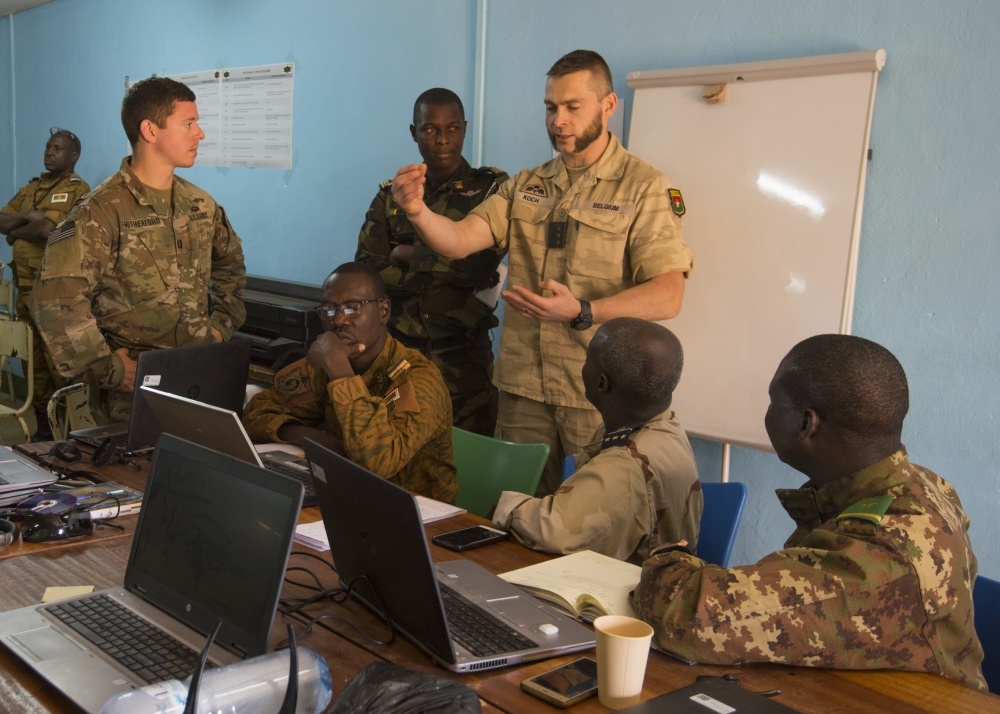 Unless international and NATO efforts are successful in transforming Burkina Faso's army into a more adequate defense force, the country is likely to succumb to ungovernable chaos. Pictured: Soldiers from the U.S., Belgium, Burkina Faso, Mali, Cameroon and Mauritania discuss information operation best practices at Camp Zagre, Burkina Faso, on February 26, 2019, during Flintlock, "an annual, African-led, integrated military and law enforcement exercise." (JMHQ Public Affairs photo by Richard Bumgardner) |
The West African country of Burkina Faso continues to be plagued by terrorist attacks committed by groups affiliated with al-Qaeda and ISIS. The attacks -- on churches, restaurants, embassies and military outposts -- not only highlight the inadequacy of the country's security forces, but threaten the sovereignty of the landlocked former French colony, located on the southern edge of the sub-Saharan Sahel region.
In June 2017, the United Nations Security Council adopted Resolution 2359, "affirming its strong commitment to the sovereignty, independence, unity and territorial integrity of Burkina Faso, Chad, Mali, Mauritania and Niger, [and] expressing its continued concern over the transnational dimension of the terrorist threat in the Sahel region."
A few months later, in December 2017, Saudi Arabia and the United Arab Emirates pledged $100 million and $30 million respectively, towards establishing a "Group of Five (G5) Sahel States Joint Force" to combat terrorism. The U.S. promised to contribute up to $60 million; the European Union said it would donate €50 million, and the G5 states -- Burkina Faso, Chad, Mali, Mauritania and Niger -- agreed to contribute 5,000 troops.
As far back as 2014, France, then under President François Hollande, had committed thousands of troops -- in an effort code-named "Operation Barkhane" (after a crescent-shaped dune in the Sahara desert ) -- to prevent jihadists being able to pass across the G5 borders.
France, like its fellow EU member states, clearly views security investment in Sahel affairs as a national interest: if the African region is overtaken by Islamist terrorists, it could be used as a launching pad for attacks on continental Europe. In addition, instability in Sahel would likely increase the number of asylum-seekers from the region.
America's efforts to hamper terrorist groups' operational capability in the Sahel are coordinated by the United States Africa Command (AFRICOM). Its principal task is to provide security assistance to insufficiently governed African countries that are particularly vulnerable to terrorist networks. AFRICOM conducts, among other programs, Flintlock, "an annual, African-led, integrated military and law enforcement exercise."
The 2019 Flintlock exercise was hosted in Burkina Faso, with a key outstation in Mauritania. Western partners included Austria, Belgium, Canada, Czech Republic, Denmark, France, Italy, Japan, the Netherlands, Norway, Poland, Portugal, Spain, Switzerland, the United Kingdom and the United States.
The Ft. Bragg, North Carolina-based 3rd Special Forces Group (SFG) that renders training assistance in Burkina Faso. The 3rd SFG places emphasis on improving the capabilities of Burkina Faso's counter-terrorist units to include sniper training, military field medicine and basic drone-operating skills.
All of these international efforts on behalf of Burkina Faso, however, appear to be failing. The terrorists have become more successful, rather than less so, in their operations to penetrate the country's borders and move with impunity through its territory. The al-Qaeda affiliate Jama'at Nasr al-Islam wal Muslimin, for example, has a local branch of an estimated 800 terrorists in Burkina Faso, while the local ISIS branch (ISIS in the Greater Sahara) has approximately 300 members.
The progression of terrorist advances in Burkina Faso has reached such major proportions that in January, a state of emergency was imposed on 14 of its provinces, where the situation is so bad that it is too dangerous for children to go to school for fear of attack.
Unless international and NATO efforts are successful in transforming Burkina Faso's army into a more adequate defense force, the country is likely to succumb to ungovernable chaos.
The overall security status in Burkina Faso cannot be solved by military assistance alone, regrettably, particularly considering that, throughout Burkina Faso's independent history since 1960, its army has maintained little connection with the citizenry, and its role in coup-plotting is legendary. To make matters worse, corruption in all sectors of Burkina Faso government and society is rampant.
There is also complex tribal and societal strife in Burkina Faso, where Muslims make up about 60% of the country's population, but are divided into different ethnic groups: the Fulani, Mossi and Mande. The aggressive proselytizing campaigns of the Fulani -- nomads who raise livestock -- against the country's Christians and Bissa (mainly subsistence farmers), have been lending weight and encouragement to the agenda of groups such as al-Qaeda and ISIS, which themselves are competing with each other for dominance.
Burkina Faso's army desperately needs to begin instituting political and social reforms. This, in tandem with complementary efforts by the U.S. State Department and European foreign ministries, is a necessary step towards retarding the onslaught of terrorist networks.
If Burkina Faso does dissolve into total chaos and loses its sovereignty to terrorists, its equally vulnerable neighbors will surely soon follow.
Dr. Lawrence A. Franklin was the Iran Desk Officer for Secretary of Defense Rumsfeld. He also served on active duty with the U.S. Army and as a Colonel in the Air Force Reserve.


